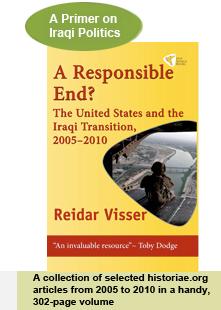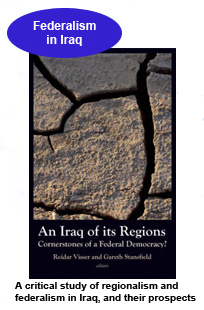



| Main | |
| Documents & images | |
| Links | |
| Contact | |
 | |
| amazon.com |

|
|
|
amazon.com
amazon.co.uk |
|

|
|
|
amazon.com
amazon.co.uk |
|
Democratic Alternatives for Iraq
By Reidar Visser (http://historiae.org)
20 March 2007
With the four-year anniversary for the start of the Iraq War and in the context of fresh legislative efforts by the Democratic Party to challenge George W. Bush’s Iraq policy, the Democrats’ attempts to establish their own alternative discourse on Iraq warrant some closer scrutiny.
Ever since 2003, a major problem for the Democratic Party has been to formulate criticism of the conduct of the Iraq War without being accused of harbouring unpatriotic attitudes. They now appear to have found a solution: the gist of the new Democratic initiative in the legislative arena – a bill titled “The Supporting Our Troops and Veterans’ Health Care Act” – is to construe the American military as the primary victim of the Iraq conflict. By putting the welfare of American troops centre stage in their bill and the accompanying rhetoric (focusing for instance on such issues as recovery from posttraumatic stress), the Democrats may be on their way to a position on Iraq which their opponents may find far more difficult to challenge.
However, in order to embellish and amplify this new message, Democratic Party politicians (and a growing number of their allies among Republican defectors) employ rhetorical strategies that are likely to make life worse for the most important victim of the Iraq conflict: the Iraqi people. To justify the focus on the welfare of the troops (and that of the American military more generally), it is necessary for Democrats to portray most aspects of the US presence in Iraq as utterly meaningless. Hence the need to define the Iraq situation as primarily an irremediable “civil war”, with a small contingent of al-Qaida fighters holed up in remote Anbar province the sole military target worthy of US military expenditure. The rest of the conflict is supposedly the Iraqis’ own fault; it is all convoluted “internal affairs” where any attempt by the international community to offer assistance is likely to be of limited value.
On the basis of this core assumption, a number of fallacies are being nurtured. John Kerry has found it useful to evoke the fact that divisions between Shiites and Sunnis “are more than a thousand years old”. (Surely divisions between Protestants and Catholics in a number of European countries also go back several centuries and generally have a bloodier history; what is Kerry’s point?) In an astonishing statement, Chuck Hagel, a Republican defector and war critic, has openly suggested that killings without a sectarian motive are somehow “worse” than sectarian killings! And Joseph Biden is still unrelenting in his calls for a three-partite ethno-religious federation – a scheme that suffers from the major defect that a majority of Iraqis are not asking for it (Biden et al. should be challenged to present evidence of support for this particular tripartite scheme – as opposed to federalism as a general principle – among Iraqi Shiites outside SCIRI and their closest friends, who together make up perhaps 30% of the United Iraqi Alliance.) In this way, the Iraqis are branded as a people incapable of living together, and the small segment of Iraqis who have truly destructive agendas are being rewarded for their efforts.
All of this is calculated to take away attention from the fact that ever since 2003, al-Qaida’s goal has been to provoke civil war in Iraq. But to isolate the sectarian killings of Baghdad from al-Qaida’s activities in Anbar (where they may be better entrenched) would be a flagrant disregard of cause and effect. Similarly, to dismiss Iraq’s civil strife as “chronic”, as Democratic commentators increasingly do, requires blind ignorance of centuries of Iraqi coexistence – as seen for instance during the monarchy (1921–1958), during Ottoman rule in the nineteenth century (when Shiites and Sunnis coexisted in the two mixed provinces of Basra and Baghdad), and during the reign of the Baghdad-based Georgian mamluks, who ruled from Mosul to the Gulf between 1747 and 1831. And to diagnose a state of “irreconcilable sectarian conflict” in contemporary Iraq would be to overlook the fact that it is the post-2003 Iraqi elites of returned exiles, rather than the Iraqi population at large, that are behind many of today’s most outrageous sectarian maximalist demands. In historical perspective, it is the current heightened sectarian tension – particularly acute since 2006 – that is the “artificial” aspect of the Iraq situation, and it should be an American responsibility to try to reverse this situation as part of a withdrawal strategy.
The problem with the new Democratic legislation is that it provides Iraq’s incumbent elites with few incentives to change their behaviour: Perform according to our benchmarks and you shall be “rewarded” with a slight extension of the US military presence; fail to meet the benchmarks, and we shall start our withdrawal right away. In all probability, if a US withdrawal is to commence as early as in July this year, the Iraqi elites that are now in power can be expected to start stockpiling for a more universal civil war. True, more responsible withdrawal plans come with a transition element and a multilateral framework for handling the post-withdrawal situation, instead of leaving it to the Iraqis to slug it out within a sealed arena, as seems to be the Democratic recommendation. But also in the proposals for increased multilateralism there are certain problems regarding the underlying assumptions about Iraqi elites. The Kurds and many Shiites will probably be happy to participate in multilateral talks as long as this means just talks and conferences, but any attempt by other Arab states at exercising real power would probably be dismissed as “foreign interference”. Iraqi Shiites may not be terribly enthusiastic about their elected politicians, but they do seem quite determined not to have their future controlled by Jordanians or Saudis or Egyptians. If such an attempt to regionalise the Iraq question should end with an impasse, this would lead to a situation in which sectarian elites propelled to power after 2003 would have a head start on everyone else.
The problem with the Bush administration’s current policy is the opposite, but it has a similar effect: with a seemingly programmatic focus on the military (as opposed to the political) track, the push on the Iraqi elites to behave in a reconciliatory fashion appears to be limited and ineffective. Most Iraqis critical of the current situation think revision of the Iraqi constitution is the key to progress, but while the constitutional revision committee does a lot of travelling abroad and has very few business meetings in Baghdad these days, US officials seem happy to describe even very modest achievements as “progress” on the national reconciliation front: “bringing criminals to justice” and moving more Iraqi troops into Baghdad were highlighted by Bush spokesman Gordon Johndroe in February, and more recently much has been made of a short visit by Iraqi premier Nuri al-Maliki to Ramadi. By dismissing early progress on the national reconciliation front as “unrealistic”, Washington is effectively sending the signal that they do not intend to push very hard on those forces that are most bitterly opposed to constitutional revision (the Kurds and SCIRI). This may be consonant with new ideas of “piecemeal” approach to national reconciliation, but it will not look good if the sole measure that actually comes out of this is an oil law that guarantees access to Iraq for foreign companies. Recalibrating the Iraqi polity requires profound institutional change, not scattered meetings and conferences.
Ironically, a more workable policy could be crafted on basis of the very template currently being used by Democratic leaders to challenge the Republicans in the US Congress. During the initial debate on the “Supporting Our Troops” act, John Murtha complained that Nuri al-Maliki had been “arrogant” in his request for more guns to Iraqi forces: Maliki had said that if guns were not provided by the US, Iraq would get them from elsewhere. What Murtha, and indeed Bush, could do, would be to follow exactly the same course as that adopted by the Democrats towards the request from the administration for an emergency war supplemental: they added more money and attached riders to it, in order to bring it closer to their own ideas about “troop welfare”. Why not attach some realistic riders to US military and aid packages to Iraq? Why not make the provision of guns conditional on progress towards constitutional reform and the holding of local elections? In this way it would be possible to create a package that would be so attractive to the Iraqi electorate that Iraqi politicians would stultify themselves by opposing it: security, military hardware and development, yes, but also timetables for both national reconciliation and the withdrawal of US forces. Most ordinary Iraqis would happily forsake sectarian pet projects if progress could be achieved in these areas. Strangely, however, Washington seems to focus on the imagined threat of some sort of popular uprising if a few of the holy cows herded by Iraq’s Green-Zone politicians were to be slaughtered.
A more balanced mix of sticks and carrots will be required if the goal is to rouse Iraqi leaders from their current inertia and help them act according to national rather than sectarian ideals. This is also where the Democratic Party could make a constructive contribution, instead of getting locked in a simplistic and ahistorical “civil war” discourse which overlooks the complexity of today’s Iraq situation.
This document may be freely reproduced as long as http://historiae.org is credited as the source.
